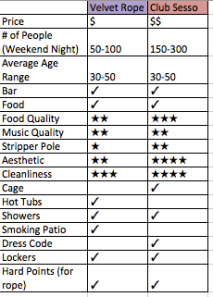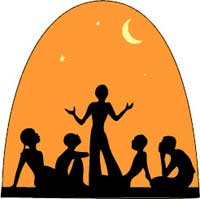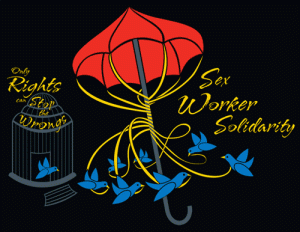I realize that I have written a formal post on New Horizons in Seattle, but that I have not done the same for the clubs in Portland- Velvet Rope and Club Sesso (I did write a description of Sesso for DatingAdvice, but did not explicitly name Sesso in the article. You can read that description here).
So if you are looking to explore a swingers club in Portland, and are trying to decide which club to try out, my bottom line advice is:
Go to both.
They are categorically different clubs and offer different experiences. I have only been to Velvet Rope twice, and Sesso countless times, and so I recognize that I am not the most qualified person to compare and contrast the two (and, I obviously prefer Sesso).
But like I said, the two offer different experiences, so it’s important to try both out, especially if you are new to the swinger scene and don’t know what to expect.
I like to describe Sesso as a sexy night club and VR as your neighborhood bar with a sexy twist. While Sesso has been built to emulate a night club and has a dance floor that you can watch from the upstairs balcony, VR feels like a converted office building and the space has random rooms and spaces. Sesso is loud, especially on the weekends, and VR is quiet. While the crowd and music at Sesso makes it feel like a crowded and social space (because it is), it means that you can’t often have good conversation with people you don’t know, because you have to talk loudly or yell to be heard. VR has an advantage here, because you can actually talk with people. Other compare and contrast characteristics: VR has hot tubs; Sesso doesn’t. VR has a smoking patio; Sesso doesn’t (smokers have to stand outside the front of the building). VR offers a more inclusive feel (they often have drag queens and male strippers perform); Sesso has a more heteronormative feel. VR is cheaper; Sesso is more expensive (and just raised its prices, which I am hating, and is actually a reason we have not been going as much). Both offer food, but Sesso has a full buffet (dinner at first, changed out to breakfast later on), while VR’s offering is much smaller and less appealing. Sesso’s aesthetic is more consistent and new than that in VR, making it feel cleaner to me. In both you are responsible for cleaning up your play areas, but at Sesso volunteers spray down each play surface before new folks use it, while at VR just the sheets are traded out. The crowd at both venues is pretty body-positive- there is a wide range of body shapes and sizes and ages present. At Sesso, though, more people get dressed up (as there is actually a dress code loosely enforced), while at VR it’s much more low-key, clothes-wise. Both play porn, both have non-private orgy spaces, both have rooms with doors that close. Both have condoms everywhere.
I know there is a community that frequents VR that absolutely loves it, and prefers it hands-down to Sesso. I think the fact that it is a more mellow, quiet space and is a smaller core community makes it feel homey for people. I think it is awesome that it offers a more inclusive space for sex-positive people of many identities.
I prefer Sesso overall, though, because I like socializing with people, and there are just more people at Sesso to socialize with. I also really like getting dressed up when I go out, and being around others who get dressed up- it makes the experience feel more sexy and glamorous to me.
Want a handy chart of how I view the two? Here it is:

Have you been to both clubs? What is your preference? Do you disagree or agree with anything I wrote? Comment! Especially so that others exploring their options can see different perspectives on the two clubs :)


 -The lunch keynote was by a Native American man who works with the Two Spirit communities in Montana and also does HIV prevention and education on the reservations. It was really cool. I also learned that Running Eagle, for whom a water feature is named in Glacier National Park, was Two Spirit.
-The lunch keynote was by a Native American man who works with the Two Spirit communities in Montana and also does HIV prevention and education on the reservations. It was really cool. I also learned that Running Eagle, for whom a water feature is named in Glacier National Park, was Two Spirit. Luckily, you can repair past damage through psychotherapy, exercise, and certain medications and plants. There has also been a paradigm shift in treating addictions. The past approach was: “Addiction is something people do to feel good and be hedonistic. Just stop!” The current approach is: “Addiction is something people do to feel normal and like everyone else.”
Luckily, you can repair past damage through psychotherapy, exercise, and certain medications and plants. There has also been a paradigm shift in treating addictions. The past approach was: “Addiction is something people do to feel good and be hedonistic. Just stop!” The current approach is: “Addiction is something people do to feel normal and like everyone else.”